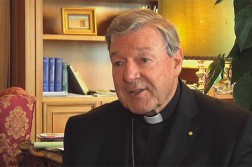It’s quite unnerving, knowing that somewhere on the other side of the world, a small group of complete strangers is gathering to decide the very future of the planet you live on. It happens but rarely — the Treaty of Versailles and the first table-read for Are You Being Served? being the only previous occasions I can summon to mind — but here it is, happening again with the Copenhagen climate talks.
Earth’s welfare sits upon a knife’s edge. The decisions made in the coming days could determine whether the human race survives and thrives, or lives out its days as a desperate rabble of rat-people, scrounging for food upon the dust-heaps and cyclone-swept garbage dumps of a bleak, godforsaken dystopia.
And yet, I have found that many of the people I talk to don’t really understand what’s going on in Copenhagen. As such, it falls to intelligent people like me to explain things slowly and with small words to less intelligent people like you. And so, I will here attempt to answer all your Frequently Asked Questions About Copenhagen. We’ll begin at the beginning.
Where is Copenhagen?
Copenhagen is a picturesque seaside town in the great nation of Denmark (or "The Netherlands", to give it its correct name), best-known as the home of Hans Christian Andersen and the world’s oldest amusement park, Dyrehavsbakken (in English, "the dire halfback").
It was selected as the location for this important summit due to its long history of commitment to environmental causes. This history is encapsulated in the form of the famous Little Mermaid statue in Copenhagen’s harbour, erected, of course, as a constant reminder of the grim consequences we may face should catastrophic climate change cause massive sea level rises and force us all to mate with fish.
What is the point of the Copenhagen Summit?
The Copenhagen Summit is a chance for leaders of all the world’s nations to get together in a comfortable, relaxed setting, and talk in extremely strong terms about the need for immediate and drastic action on climate change, with the aim of achieving deep cuts in global emissions and transitioning to a low-carbon economy, via a stringent and effective series of videos featuring young children having bad dreams.
Look! The videos tell us. If you don’t do something about climate change, it may be YOUR children’s sleep patterns being disrupted. This technique is well established in international politics and follows in the footsteps of the "bogeyman in your underpants drawer" campaign which convinced the USA to enter World War II. If history has shown us one thing, it is that real and lasting change can only come about through well produced short films.
There will also be negotiations on binding agreements to urgently lower emissions across the world, during which it will be agreed that nobody can do anything until China does.
What is Australia’s role in the summit?
Unfortunately, Kevin Rudd was unable to get his emissions trading scheme — which would have guaranteed both near-noticeable cuts in emissions in the next 50 years and a guaranteed secure future for our children working in open-cut coal mines — through the Senate. As a result, Australia could not arrive in Copenhagen with definitive legislation to show the world, and therefore Rudd will have to quickly come up with something else for the other countries to ignore.
In a nutshell, Australia’s role is to act as a facilitator between the big polluters. Think of America as the handsome captain of the football team, and of China as the beautiful, unattainable principal’s daughter. It will be Australia’s job, as the short, unattractive chess club president, to pass surreptitious notes between them, saying things like, "I think ur hott — too much CO2?" and "Will you go out with me Sat. Bring solar panels," until the two superpowers either reach an agreement, or split up and go off in a huff, ending with China dead in a car crash and America getting India pregnant.
Hopefully Australia can really do a good job in bringing the giants together to solve this problem. Rudd has already made a good start, faxing all leaders a world map with Australia circled in red pen.
What are the main obstacles?
The obstacles to meaningful change fall into three broad categories:
i) The need to slash emissions without dramatically lowering living standards;
ii) The feeling among developing countries that they are being asked to stunt their own development to shoulder the burden of the big countries who emit more; and
iii) The fact that nobody is actually going to do anything.
All three of these will take some hard work and lateral thinking to overcome, but can all probably be solved by keeping one simple, elegant fact in mind: developing countries are nasty little dirtballs who will do what we tell them to. Three birds, one stone!
What about the domestic political implications?
This is rather tricky. Tony Abbott rose to the Liberal leadership on a platform of inaction on climate change, and has seemingly electrified the electorate with his dashing combination of scepticism and manic laughter, as demonstrated in the Higgins and Bradfield by-elections, where the Liberals stunned the nation with a crushing retention of the status quo.
So where Australian climate change policy goes from here is anyone’s guess. Abbott, of course, described climate change as "crap", to which deposed leader Malcolm Turnbull replied that Abbott’s policy was "bullshit".
So essentially, the Liberal policy boils down to a choice between crap and bullshit, giving substance to Abbott’s promise to return the party to classic Liberal values.
Meanwhile, Kevin Rudd, who eschews such earthy language outside RAAF flights, has merely commented that Abbott is pursuing a "magic pudding policy"; which sounds pretty good. If Tony Abbott can introduce a new form of clean energy that not only never runs out, but is also accompanied by a singing koala, I’m pretty sure he’s home and hosed.
What is "Climategate"?
Climategate is a scandal involving the revelation of the fact that the media, once having got hold of a concept, will continue to flog it relentlessly for decade upon decade, no matter how annoying or sad it becomes. It would have been perfectly easy to call it "The Great Science Scam" or "The Curious Case of the Hidden Decline", but no, we went with Climategate because we’re all just a bunch of soulless dead-eyed automatons trudging inexorably towards death, our last spark of originality and verve having been extinguished by the hideous zombie-virus we call "journalism".
But I digress. Climategate is also an affair in which scientists at the University of East Anglia were found to have sent emails to each other describing ways in which they withheld and distorted data for their own nefarious ends, and also amusing photographs of aroused monkeys. These emails prove conclusively that global warming is not happening, making the Copenhagen conference a bit of an anti-climax, really. The delegates will undoubtedly feel a bit sheepish when they find out, although to be honest, that cold day last week should have been a dead giveaway.
On the plus side, it does mean all those round-the-world flights won’t have done any damage.
What is the view of chemically imbalanced Australian opinion writers?
Glad you asked. The Australian commentariat displays an exciting range of viewpoints. Well-known climatologist/film critic Andrew Bolt expresses the opinion that graphs demonstrate the futility of Copenhagen, while Piers Akerman claims to have conclusive proof that Labor’s ETS contains clauses making homosexual rape mandatory. Tim Blair, on the other hand, points out that Al Gore is fat, while Miranda Devine blames climate change on abortions and suggests abolishing speed limits as a solution. You could also check out the views of Clive Hamilton, but you probably wouldn’t like them much.
What will be the consequences of a global agreement on climate change?
The most obvious consequence, of course, will be the complete destruction of Australian industry, as energy costs skyrocket and everyone moves to Indonesia, which will not have signed up to the global agreement because they have Strong Leaders. This will leave much more room for the rest of us to stretch out and relax but we won’t be allowed to use coal, so we’ll be forced to rely on wind power, which is insufficient for baseload, so we’ll probably just end up going to bed really early. It’ll be good for us.
The other major consequence will be the One World Government, which will force us at gunpoint to give it all our money, which will be spent on heroin injecting rooms. Barack Obama will be the president of this government, and will commence executing the elderly almost immediately.
It is also possible that carbon emissions will be stabilised and catastrophic climate change will be averted, ushering in a new era of global cooperation and safe, clean energy to power the economies of the future. Then again, it’s possible that Wayne Swan will be caught in bed with Nikki Webster — it’s fine to hope for these things, but let’s not be stupid about it.
Last question please!
Why does Tim Flannery always seem so upset?
He’s cranky through lack of sleep. Try to ignore him.
Donate To New Matilda
New Matilda is a small, independent media outlet. We survive through reader contributions, and never losing a lawsuit. If you got something from this article, giving something back helps us to continue speaking truth to power. Every little bit counts.



